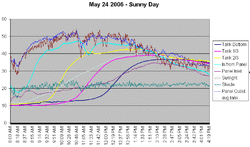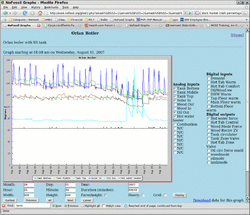Over the past two years, I've been refining, testing, and living with a solar hot water system during the non-woodburning seasons. I've put together a writeup for anyone who might be interested in a similar project.
This system sits on the ground, uses water, is not pressurized, and relies on thermosiphoning for water circulation. 80% reduction in oil for heating water this season!
Link is here - pictures, graphs, and writeup. Enjoy!
This system sits on the ground, uses water, is not pressurized, and relies on thermosiphoning for water circulation. 80% reduction in oil for heating water this season!
Link is here - pictures, graphs, and writeup. Enjoy!




